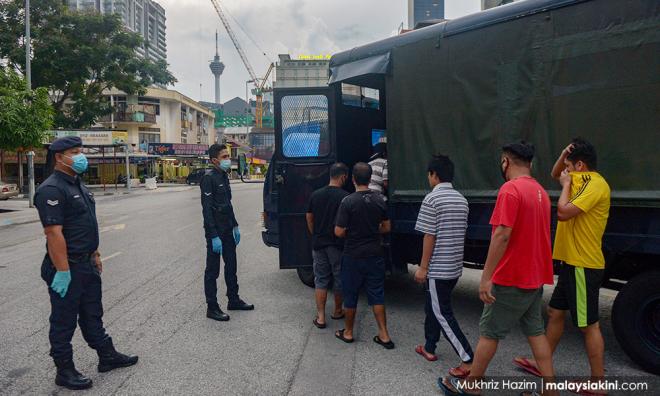
A collection of 62 NGOs today expressed concern at the government's decision to arrest undocumented migrants within the enhanced movement control order (MCO) areas aimed at containing the spread of Covid-19.
They say the arrests come at a time where the undocumented migrants need to be encouraged to come forward and get tested for Covid-19 but the detention will have the opposite effect.
They also expressed concern that the mass arrests may lead to a situation where social distancing is difficult to practice in detention centres.
However, Defence Minister Ismail Sabri Yaakob had defended the move, stressing that all those arrested have been tested for Covid-19.
The NGOs joint-statement is as follow:
We the undersigned organisations view with great concern reports of mass arrests of migrants, refugees, and asylum seekers today in Kuala Lumpur, on the grounds of potentially further increasing the number of Covid-19 cases, as well as on humanitarian grounds.
The logistics of mass arrests and mass incarceration invariably involve situations where the complete opposite of social distancing is practised.
Should mass arrests result in an increased rate of Covid-19 infections in detained migrants, this will lead to an increased risk of infections among Malaysians who work in detention centres and other related jobs.
This in turn increases the risks of infections of the public as a whole.
As the Singapore example has shown, managing the spread of Covid-19 among migrants is a key battlefront.
The best way to combat Covid-19 holistically is for all individuals, including migrants, to come forward for testing, especially when exhibiting symptoms.
Should the authorities resort to the mass arrests of migrants, this will invariably create a culture of fear that will ripple out amongst migrant communities, and completely scare them away from coming forward to be tested.
Indeed, migrants will probably be even more inclined now to go into hiding, and to avoid detection at all costs.
With the transition to a conditional MCO on May 4, migrants who fear detention will be even harder to track and to trace, resulting in severe health risks for the Malaysian public.
Government statements, such as those made by Defence Minister Ismail Sabri Yaakob on the March 22 gave migrants the impression that they were free to come forward for testing, without fear of repercussions.
This was the correct approach and one that would most likely lead to the faster elimination of Covid-19.
The government’s recent actions can be seen as yet another u-turn in which the sense of trust that they tried to build among migrant communities has now been betrayed.
It is hoped that the government is not making rash decisions or being overly reactive to the propaganda, fake news, and hate mongering that has been spreading online towards particular migrant groups.
The government should always act based on what is right, what is moral, and what is in the best long term interests of the nation. It should not be swayed by a mob mentality.
We also view with grave concern reports that many children, some as young as four years old, have also been swept up by these arrests.
This is an appalling violation of the rights of children, who should not under any circumstances be detained or treated like criminals.
We acknowledge the issue of migration is a complex one that requires multilateral solutions that take into consideration all stakeholders, including those in the international community.
We urge the government to avoid mass arrests and mass incarcerations, and to instead approach this problem using principles grounded in reliable data, sound health policy, and compassionate humanitarianism.
Endorsed by:
1. Advocates for Non-discrimination and Access to Knowledge (ANAK)
2. Agora Society
3. ALIRAN
4. Angkatan Belia Islam Malaysia (ABIM)
5. Bersih 2.0
6. Beyond Borders Malaysia
7. Buku Jalanan Chow Kit
8. Centre for Human Rights Research & Advocacy (CENTHRA)
9. Center for Independent Journalism (CIJ)
10. Center for Orang Asli Concerns (COAC)
11. Childline Foundation
12. Citizens’ Health Initiative
13. Consumers Association of Penang (CAP)
14. Dapur Jalanan KL
15. Development of Human Resources for Rural Areas (DHRRA)
16. Eliminating Deaths And Abuse In Custody Together (EDICT) Malaysia
17. EMPOWER Malaysia
18. ENGAGE
19. Foreign Spouses Support Group (FSSG)
20. G25 Malaysia
21. GERAK (Pergerakan Tenaga Akademik Malaysia)
22. Geutanyoe Foundation
23. Global Shepherds
24. Good Shepherd Services
25. Health Equity Initiatives
26. IMAN Research
27. Jaringan Rakyat Tertindas (JERIT)
28. Justice for Sisters
29. KeArah 189 (Domestic Workers Coalition - migrant and local)
30. KitaJagaKita
31. Klima Action Malaysia
32. KRYSS Network
33. MAJU Foundation
34. Malaysian Council of Child Welfare
35. Malaysian Social Research Institute
36. NGOhub
37. North South Initiative
38. Our Journey
39. Parti Sosialis Malaysia
40. Penang Forum
41. Project Liber8
42. Projek Wawasan Rakyat (POWR)
43. People Like Us Support Ourselves (PLUsos)
44. People’s Health Forum
45. Persatuan Kebajikan Biji Sawi (Mustard Seed Soup Kitchen)
46. Persatuan Sahabat Wanita Selangor (PSWS)
47. PT Foundation
48. Public Health Society MMA
49. Pusat KOMAS
50. Refuge for the Refugees
51. Reproductive Rights Advocacy Alliance Malaysia (RRAAM)
52. Sabah Human Rights Centre
53. Sabah Reform Initiative (SARI)
54. Sahabat Alam Malaysia
55. Saya Anak Bangsa Malaysia (SABM)
56. SUARAM
57. Tenaganita
58. Third World Network
59. Toy Libraries Malaysia
60. Voice of the Children
61. Women's Centre for Change
62. Yayasan Chow Kit
- Mkini


No comments:
Post a Comment
Note: Only a member of this blog may post a comment.